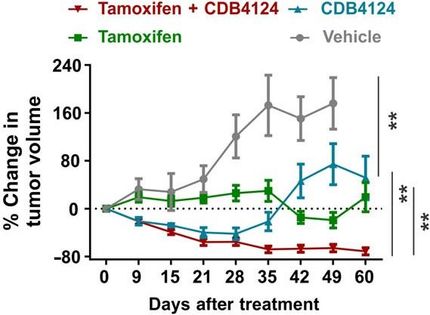Single protein promotes resistance to widely used anti-estrogen drugs
Researchers at Georgetown Lombardi Comprehensive Cancer Center have uncovered a single molecule they say is a major determinant of resistance to anti-estrogen therapy used to treat or prevent breast cancer in high-risk women.
In Cancer Research, the scientists say glucose-regulated protein 78 (GRP78), activated as breast cells undergo stress induced by the agents tamoxifen and fulvestrant, turns off apoptosis, a cell death response, and turns on autophagy. In autophagy, the cell "eats" and digests components within the cell body that have been harmed by the drugs, thus providing a blast of nutrients needed to maintain life.
The finding suggests that a novel agent that inhibits GRP78 might provide a solution for the tens of thousands of women who develop resistance to anti-estrogen drugs. While more than 70 percent of breast cancers express estrogen receptors that fuel growth of cancer, about one-third of these cases fail to be cured by therapies that target this receptor.
"Since GRP78 plays such an important role in drug resistance, it would be of great benefit to develop agents that target this protein," says the study's lead author, Katherine Cook, Ph.D., a postdoctoral investigator in the lab of Robert Clarke, Ph.D., D.Sc., professor of oncology and Dean for Research at Georgetown University Medical Center. Clarke is the study's senior author.
She adds that several GRP78 inhibitors have already been developed and are already being tested, but not yet at the level of human clinical trials.
The study is not only the first to show that GRP78 is a regulator of resistance to tamoxifen and fulvestrant, it is also the first to reveal the mechanism by which GRP78 directly controls autophagy, says Clarke.
"Why estrogen-receptor positive breast tumors fail to respond, or respond initially and progress upon acquiring resistance to these agents, has been largely unknown, " he says. "The novel signaling that we have uncovered could have high translational impact and bring a new and important perspective to the molecular crosstalk between cell stress, apoptosis, and autophagy."
This research is a continuation of a string of studies on anti-estrogen resistance by Clarke, Cook, and their collaborators at Georgetown.
Other news from the department science

Get the life science industry in your inbox
By submitting this form you agree that LUMITOS AG will send you the newsletter(s) selected above by email. Your data will not be passed on to third parties. Your data will be stored and processed in accordance with our data protection regulations. LUMITOS may contact you by email for the purpose of advertising or market and opinion surveys. You can revoke your consent at any time without giving reasons to LUMITOS AG, Ernst-Augustin-Str. 2, 12489 Berlin, Germany or by e-mail at revoke@lumitos.com with effect for the future. In addition, each email contains a link to unsubscribe from the corresponding newsletter.
More news from our other portals
Last viewed contents
Evotec Starts Phase II Clinical Studies in Treatment-Resistant Depression

Biofortuna Ltd. - Liverpool, United Kingdom

GNA Biosolutions GmbH - Martinsried, Germany

UgenTec - Hasselt, Belgium

GUINAMA S.L.U. - Puebla de Vallbona, Spain



















































